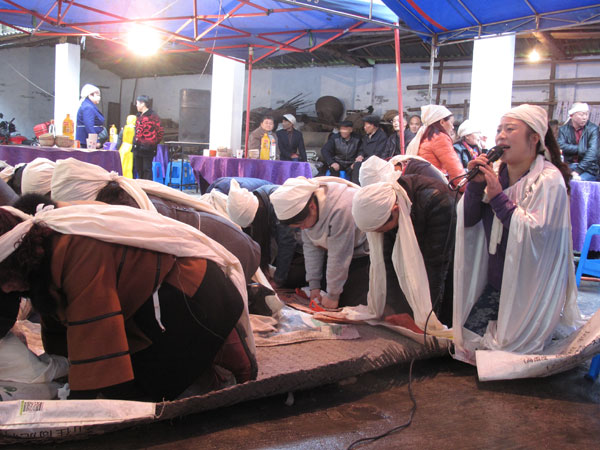Mourners get paid to pay respects
Updated: 2016-04-01 07:59
By HUANG ZHILING(China Daily)
|
|||||||||
 |
|
Professional mourner Chen Jiying (right) at a funeral in Pixian county, Sichuan province. [Photo by Huang Zhiling/China Daily] |
Kneeling in front of the body of a 74-year-old woman, Chen Jiying has a microphone in her hand and wails as she tells those gathered around about the hardships the dead woman endured in bringing up five children at a time when Chinese farmers were extremely poor.
Chen's sorrowful words touch the hearts of many among the 14 relatives of the deceased who are kneeling beside her. Most give way to tears.
As she climbs to her feet, those looking closely might notice 42-year-old Chen's eyes are still dry.
Chen, who lives in another town in Pixian county, Sichuan province, is a professional mourner and has been paid for her role in this memorial service. Paying someone to lead the grieving at a funeral is a tradition in Sichuan's rural areas.
She is usually employed by the relatives of the deceased and typically reaches the home of the departed about two hours before the service starts, where she asks relatives details of the dead person's life.
Later, Chen will retell that story through sobs, calling the deceased "dad" or "mom" as if she were part of the family. Because it is common for old people from the area to have lived through hardships in their early years, Chen's tearful narration usually focuses on their difficult lives, and relatives are often left heartbroken.
Chen plies her trade about 320 days of the year.
It is a service for which customers usually pay 830 yuan ($127) and crying sessions last about 40 minutes, according to Chen Chaoqing, a middle-aged man who runs a funeral company in the county.
Many rural residents criticize the practice and say people like Chen have no real feelings for the deceased. Chen said she cries every day for people who have nothing to do with her largely because she needs money to support her family. But she insisted she often is really affected emotionally by the sorrow of the relatives.
Three months ago, an octogenarian passed away in the suburbs of Chengdu, the capital of Sichuan. The woman's son was heartbroken and rolled around on the ground in his grief. "His sorrow touched me and I cried sincerely," Chen said. "My sorrow in turn influenced her relatives and they all cried."
Born into a farmer's family in Pengzhou, a city bordering Pixian, Chen started working as a paid mourner by accident.
When she graduated from high school at 18, a neighbor in her village passed away. It was popular at that time to invite people to sing pop songs and dance at the memorial service. A singer was paid for. He earned around 5 yuan and had a free dinner. "I admired the singers because they could make money and have free meals," Chen said.
Because she had been good at singing as a child, she thought she might be able to sing as well and asked to have a go. The person in charge of the service agreed and found she was indeed a good singer. "When that person provided a memorial service the next time, he asked me to be a singer and, later, I became a professional mourner," she said.
Chen's husband is a home decorator but her 20-year-old daughter, who graduated from a technical secondary school, now also works as a mourner.
Chen said their work has real value because professional mourners help people deal with their sorrow.
Zhao Zhuoxiang, an elderly farmer from You'ai town in Pixian, agreed that Chen and others like her are doing an important job.
Zhao said elderly residents respect people like Chen and call them "teacher", which is how people in Sichuan address those they respect.
But many young residents cringe at the slightest mention of being a professional mourner, and few among the younger generation respect the work.
According to Chen Chaoqing, the number of professional mourners in Pixian, which has a population of more than 500,000, can be counted on two hands, perhaps accounting for why the few that are left still have such busy schedules.
But neither Chen Chaoqing nor Chen Jiying could say whether anyone will be doing the work in another 30 years.
Related Stories
Tensions run high ahead of funeral 2016-03-02 08:20
Funeral reforms seek to save space 2016-02-25 08:23
Mourning families accuse officers of excessive force 2015-12-29 08:17
Nation in mourning as siege hotel yields clues 2015-11-24 08:17
Ceremony on hold for mourning 2015-04-21 07:39
Public mourning for Taiwan plane crash victims on Feb. 10 2015-02-09 13:01
Today's Top News
Xi-Obama bilateral talk to advance ties
Foreign companies reassured on new Internet rules
Beijing and Prague form new key link
Trump drops pledge to back Republican nominee
China, Czech Republic set up strategic partnership
EgyptAir hijacker arrested, all passengers freed
Panda to join Little Mole in new cartoon series
President optimistic for Sino-German cooperation
Hot Topics
Lunar probe , China growth forecasts, Emission rules get tougher, China seen through 'colored lens', International board,
Editor's Picks

|

|

|

|

|

|






